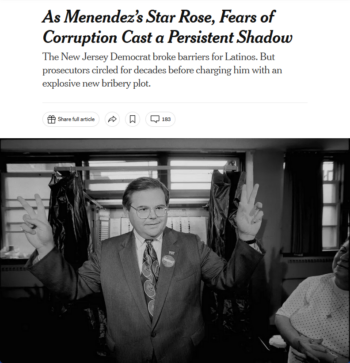
New York Times (9/27/23)
This week on CounterSpin: You can’t say elite US news media aren’t on the story of the federal indictment of Robert Menendez, Democratic chair of the Senate Foreign Relations Committee. But articles like the New York Times’ “As Menendez’s Star Rose, Fears of Corruption Cast a Persistent Shadow” represent media embrace of the “great man of history” theme: The story is mostly about the political fortunes of an individual; the huge numbers of less powerful people impacted by those compromised decisions are, at best, backdrop.
When they try to tighten it into a “takeaway,” it can get weirder still: That Times piece’s headline included the idea that “the New Jersey Democrat broke barriers for Latinos. But prosecutors circled for decades before charging him with an explosive new bribery plot.”
Come again?
If elite media’s takeaway from the Menendez indictment is that some people over-favor their friends and like gold bars—that’s a storyline that leads nowhere, calls nothing into question beyond the individual actors themselves. Is that the coverage we need? What does it even have to do with foreign policy?
Stephen Zunes is a professor of politics at the University of San Francisco. His most recent book, co-authored with Jacob Mundy, is Western Sahara: War, Nationalism and Conflict Irresolution, out now in a revised, updated edition from Syracuse University Press.
We talk with him about what’s at stake in the Menendez indictment beyond Menendez’s “political fortunes.”
Plus Janine Jackson takes a quick look at recent press coverage of the FCC and the 1973 Chilean coup.
The post Stephen Zunes on Menendez Indictment appeared first on FAIR.
This content originally appeared on FAIR and was authored by CounterSpin.